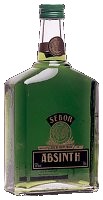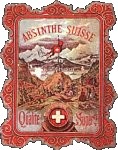
|
Order in Chaos... Home Absinthe What is Absinthe? Absinthe History Absinthe Today My Absinthe Experiences
The Green Hour Classic Computers Current Computers Dwarven Runes Electronic Projects Entertainment Gardening Model & Sport Rocketry Photo Album Programming Video Special Effects About the Author www.chattaway.com multiserve.chattaway.com |
|
Absinthe StatisticsI have purchased and tried six brands of absinthe, from four different countries. On this page I go into the nitty gritty of the vital statistics of absinthe, to help you understand the basis of my decisions on which brands to buy, and what I was expecting of them. The following is a table of the brands I've purchased, and the vital statistics of each brand:
* The original bottle is not shown in order to protect the supplier, instead an original 19th century Swiss label offered by the supplier is shown. Prices are current as of 2002, in Canadian dollars (which are currently on par with US dollars as of 2008). I list the prices I paid as a Canadian personal importer; your mileage will vary. In particular, US residents should really use a US-based supplier (such as Betina Elixirs, listed on the links page) in order to avoid any potential customs hassles (many European suppliers just plain refuse to ship to the US due to customs). Thujone concentrations are estimates at best; there is no cheap & accurate way to measure it (thujone is an oily substance that dissolves completely in alcohol and has a similar weight and density). It would take a lot of time and money and an expensive lab to do a proper chemical breakdown, and to my knowledge only Hill's has done so (in order to be approved for sale in Canada). Depending on the brand, the size of the glass and how much ice is used (if any), the alcohol concentration of a prepared serving (28mL of absinthe diluted with 100-200mL of water) can vary from 7% to 18%, the alcohol content can vary from 16mL to 21mL, and the thujone content can vary from 45µg to 2100µg. Obviously, the most authentic "absinthe effect" can be obtained by drinking the Suisse La Bleue neat (hopefully over ice at least!). However, as experience has taught me, drinking any alcoholic beverage of over 40% alcohol can really wreak havoc with your body... know your limit, stay within it! Anyway, I expect that alcohol intoxication would soon overpower any effect thujone might have if you continued to drink it this way. It's interesting to note that once diluted with water, even the strongest brand (the Suisse La Bleue) has a thujone concentration of only 9ppm, just below the European Union's maximum of 10ppm for a ready-to-serve beverage. Diluting doesn't mean you're getting less thujone per serving, it's just being spread out a bit more, softening the blow, so to speak. |
||||||||||||||||||||||||||||||||||
All pages, files, and graphics Copyright © 1995-2008 Paul Chattaway, All Rights Reserved,
unless otherwise specified or someone else's copyright or public domain.
Questions or comments about this site? Send an e-mail to Paul Chattaway





